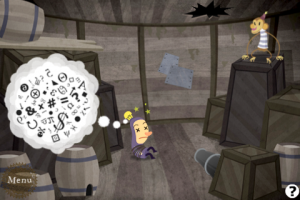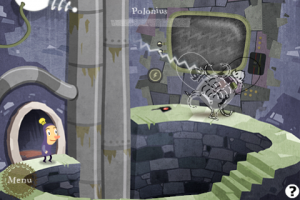Someone, somewhere, is taking drastic liberties with Shakespeare’s Hamlet. Claudius now offs both the title character’s parents and runs off with Ophelia, whose brilliantly unstable mind has been replaced with a flat princess-in-distress act. These sudden revisions to the script would be nightmare enough for any theatre director, but things become even more surreal when a man with a light bulb screwed into his cranium accidentally lands his time machine – yes, his time machine – on Hamlet, disabling the protagonist. The unnamed time traveler decides to wear his rue with a difference, and sets off to rescue Ophelia from Claudius’ clutches while Hamlet recovers in the wings.
 That’s just the way things roll in Hamlet or the Last Game Without MMORPG Features, Shaders and Product Placement (Out Now, $.99, Lite). While the game doesn’t require the least bit of familiarity with Shakespeare’s classic tragedy, it does cater very specifically to those with a healthy interest in testing their logic puzzle skills. The player usually helps Hamlet’s stand-in progress by shaping his immediate environment, tapping on a series of objects in a very specific sequence so that they interact to clear his path of obstacles or live antagonists.
That’s just the way things roll in Hamlet or the Last Game Without MMORPG Features, Shaders and Product Placement (Out Now, $.99, Lite). While the game doesn’t require the least bit of familiarity with Shakespeare’s classic tragedy, it does cater very specifically to those with a healthy interest in testing their logic puzzle skills. The player usually helps Hamlet’s stand-in progress by shaping his immediate environment, tapping on a series of objects in a very specific sequence so that they interact to clear his path of obstacles or live antagonists.
It’s impossible to neatly summarize the entire range of puzzles the time traveler encounters, however; the variety here includes both the imaginable and the unimaginable. A few minutes after solving a combination lock, the player can expect to find him-or-herself going toe-to-toe with a macaque in a game of cards, trying to figure out the rules by which the monkey plays. Hamlet is simply that kind of experience.
The consistent ingenuity that went into Hamlet‘s puzzle design certainly deserves the attention of genre fans, but that doesn’t mean the game is flawless. Alawar did an excellent job of ensuring most of their puzzles can be solved with general wit and in-game clues, but one in particular stood out to me as requiring a very specific cultural background: a padlock that must be operated with knowledge of how emoticons are typed in bulletin board code. Not a problem for a wide swath of the iDevice gamer population to be sure, but I, for one, started to sense how old I’m getting.
 Secondly, the puzzles Hamlet serves up are so utterly outlandish that tapping the game’s “Hint” button tends to be just the start of finding solutions. This “Hint” button can only be called upon after an initial charging period, which sometimes leaves the player staring at his or her iDevice without a clue as to how to proceed at first. Some puzzles certainly lend themselves to blind experimentation, but I’m probably not the only player who would welcome a faster “Hint” refill rate, or perhaps the carry-over of a fully charged “Hint” button from previous puzzles as a reward for player performance. The average player should complete Hamlet in around two hours or so (maybe with a peek or two at FAQs available for the PC version!); at such a short length the puzzle genre’s inherent replay value limitation kicks in, so be forewarned that this is a one-shot deal unless the player wants to dive in again simply to re-experience the game’s kooky art style and plot direction.
Secondly, the puzzles Hamlet serves up are so utterly outlandish that tapping the game’s “Hint” button tends to be just the start of finding solutions. This “Hint” button can only be called upon after an initial charging period, which sometimes leaves the player staring at his or her iDevice without a clue as to how to proceed at first. Some puzzles certainly lend themselves to blind experimentation, but I’m probably not the only player who would welcome a faster “Hint” refill rate, or perhaps the carry-over of a fully charged “Hint” button from previous puzzles as a reward for player performance. The average player should complete Hamlet in around two hours or so (maybe with a peek or two at FAQs available for the PC version!); at such a short length the puzzle genre’s inherent replay value limitation kicks in, so be forewarned that this is a one-shot deal unless the player wants to dive in again simply to re-experience the game’s kooky art style and plot direction.
Hamlet has been ported to the iOS with extraordinary panache, the sheer smoothness of the experience helping to offset the game’s shortcomings. In an era where Action RPG ports can barely get a virtual button working consistently, the fact that the player can reliably tap on the tiniest levers, buttons, and other small-scale objects in Hamlet sure is refreshing.
Screenshots adequately express what the player can expect from Hamlet aesthetically. More important than the artwork’s stylishness is the fact that it’s all presented crisply on the touchscreen, since the game almost crosses into the Hidden Object genre with its occasional demands that the player sift through environments in search of very small or well-concealed objects. Hamlet is similarly cartoonish in the audio department, its music tending toward minimalism when sound effects become important in solving its puzzles.
iFanzine Verdict: First and foremost, Hamlet’s iOS port is an exemplar of good pricing decision. The complexity (and sometimes the “D’oh, I should have known that!” factor) of its puzzles frustrates at times, but the overall execution is so smooth that it’s almost impossible to overlook at the price of a buck, especially if you’re already a fan of challenging logic puzzle games. Gamers who enjoy Hidden Object titles would also do well to check this out, since its mechanics share plenty of similarities with that genre.


